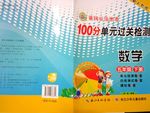题目内容
The idea to go to West Hill wonderful
- A.looks
- B.tastes
- C.sounds
词义辨析。句意是“去西山的主意听起来很棒”。故应该是C。look意为“看起来”,taste意为“尝起来”,不符合题意。

 智慧课堂密卷100分单元过关检测系列答案
智慧课堂密卷100分单元过关检测系列答案 单元期中期末卷系列答案
单元期中期末卷系列答案Burch has been riding his white horse 4 miles to and from school 37 __________the beginning of the semester. “Every morning, wearing my blue jacket and jeans, I’m on my way at 6 am.” Burch says, “The streets are mostly 38__________ at this time of morning. It’s a nice way to start the day.”
The idea was his 39__________. His family were enjoying their vacation on their farm this summer, “My dad just said, ‘Roby, you 40__________ ride your horse to school every day.’” says Burch. He thought it really was a good idea.
When they got back home, Burch asked for permission from the headmaster (校长), Joe Cox, and surprisingly, he got the green light. Cox even 41__________ Burch to keep the horse next to the headmaster’s house. Then his dad helped Burch find the best route to school. It is along back streets and has 42__________cars than the others.
For the return trip every afternoon, Burch leaves school at 5:45 pm. Even now, as the days grow shorter and colder, he 43__________ to ride his horse. “ I will ride my horse even in the coldest weather.” he says.
Burch says the first time he sat on a horse as a four-year-old boy he was afraid. 44__________ now, “it’s what I do best.” It’s no surprise that he wants to be a cowboy (牛仔) when he grows up. “I love riding horses more than 45 __________ else.” He says, “It’s really a guy thing.”
| 【小题1】 |
|
| 【小题2】 |
|
| 【小题3】 |
|
| 【小题4】 |
|
| 【小题5】 |
|
| 【小题6】 |
|
| 【小题7】 |
|
| 【小题8】 |
|
| 【小题9】 |
|
| 【小题10】 |
|
Is learning a foreign language ever easy? Yes. If you are five and move to another country, you will quickly pick up the language. But what about for the rest of us who are no longer five, and need to be polite when traveling for business or for pleasure? I think that answer is also yes. Language learning can be easy if you don’t want or need to learn too much.
The key to successful language learning in my mind is not to set the goal too high. It is rather like running. Even if you run twice a week, you don’t necessarily want to be able to run a marathon (马拉松). You might just want to keep a level of fitness. I think the same can be true for language learning.
Let’s get back to the goal. If you decide to learn ten words in a foreign language before visiting the country, you know that you will be sure to do this. However, if you decide to talk to people with great fluency (流利), unless you are quite a talented person, you will probably fail and give up in half-way.
It is also far easier to start learning a foreign language than to finish. In other words, the better you are, the slower it can be to improve, because you will not be able to move further because of grammar, making sentences, learning less common words, etc. If you are only trying to learn a few foreign words and sentences, you will enjoy faster progress, have more fun, and won’t have to spend too much time.
The idea of learning only a few hundred words in a language, and then stopping, isn’t the usual way to language learning, but it can be a very meaningful and enjoyable activity.
【小题1】In the writer’s opinion, it is easy for adults to learn English if _______.
| A.they are especially talented people |
| B.they don’t want or need to learn too much |
| C.they have to spend a lot of time on it |
| D.they have a chance to go abroad |
| A.forget your own goals |
| B.become a talented language learner |
| C.get tired of learning it |
| D.reach your learning goal |
| A.Easy Language Learning | B.Hard Language Learning |
| C.Fluency in a Foreign Language | D.A way of Language Learning |
I'm searching for sports T-shirts. Do you have any good ideas?
【小题1】 I think the NIKE T-shirts are better than others. Last month, I saw a T-slyirt of new style in a shop. It looked very nice. Its color was blue. I feel that the NIKE T-shirt is a bit expensive. It's about 400 Yuan.Even though it's a bit expensive, I advise you to buy it. It's made of cotton. 【小题2】
If you want to buy some cheaper ones, you can search the Internet Shopping onlihe is becoming more and more popular today. 【小题3】
You should go to the shop and choose clothes by yourself. 【小题4】 So I think you’d better choose clothes according to your own body. If you are thin, Buy one in a warm color. If not, buy one in a dark color.
I have a good idea. 【小题5】 You can design your favorite pictures on it. If you are a football fan, perhaps Beckham's photo is a good choice. Designing your own T-shirt is in fashion this year. It will show your own art of dressing.
| A. So it must be very comfortable. |
| B.Not all famous brands can make you look better. |
| C.You can also compare the styles and prices online. |
| D. Why don't you buy a white T-shirt? |
“When can I get a cell phone?” The answer is when your parents think you need one, though many kids seem to be getting them around age 12 or 13. Some younger kids may have them because their parents see it as a matter of safety and convenience. For example, a kid can call mom and dad when sports practice is over. And a cell phone can give kids almost instant access(快捷通道) to their parents if something goes wrong or they need help. It can give parents quick access to their kids so they can check on them and make sure they’re OK.
If you do get a cell phone, make some rules with your parents, such as how many minutes you’re allowed to spend on the phone, when you can use your phone, when the phone must be turned off, and what you will do if someone calls you too often, and so on.
You’ll also have to learn to take care of the phone in your life. Keep it charged(充电) and store it in the safe place so it doesn’t get lost. And whatever you do, don’t use it in the bathroom. I know someone who dropped her phone in the toilet!
1.Parents buy cell phones for their kids because ___________.
|
A.they think it is necessary |
|
B.they think their kids are old enough |
|
C.they have asked the author for advice |
|
D.they want to follow their kids wherever they are. |
2.The author of the passage ___________.
|
A.wants to describe how children use cell phones |
|
B.knows nothing about when children can have a cell phone |
|
C.may have done a survey on kids using cell phones |
|
D.has been a teacher for many years |
3.Which of the following is true?
|
A.It is too young for kids of 12 or 13 to get a cell phone. |
|
B.A cell phone is useful for kids and their parents. |
|
C.The author is against the idea of kids to have cell phones. |
|
D.Most kids are considering having cell phones. |
4.Who is the passage most probably written by?
|
A.Parents who have bought phones for their kids. |
|
B.Someone who does cell phone business. |
|
C.A teacher who cares most about school safety. |
|
D.Someone who works for children’s education. |
5. Which might not be a rule for kids with a cell phone?
|
A.Keep it on all the time. |
|
B.Make a call if something goes wrong. |
|
C.Don’t use it in the bathroom. |
|
D.Take care not to lose it. |